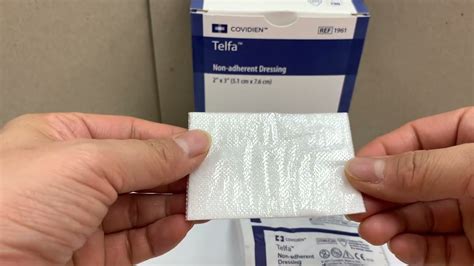Telfa Non Adherent Dressing How To Use
Ronan Farrow
Mar 26, 2025 · 3 min read

Table of Contents
Telfa Non-Adherent Dressing: A Comprehensive Guide on How to Use
Telfa non-adherent dressings are a popular choice for wound care due to their gentle, non-stick nature. Understanding how to properly apply and remove them is crucial for optimal wound healing and preventing further irritation. This guide will walk you through the process step-by-step.
What is Telfa Dressing?
Telfa is a brand name for a type of non-adherent dressing. Non-adherent means it won't stick to the wound itself, minimizing pain and trauma during dressing changes. This is particularly important for wounds that are sensitive or prone to bleeding. The dressing typically consists of a soft, absorbent pad that is often covered with a thin, non-stick layer. This layer allows for easy removal without disturbing the healing process.
How to Apply a Telfa Dressing
Before applying a Telfa dressing, always ensure your hands are clean and you're working in a sterile environment as much as possible. Here's a step-by-step guide:
Step 1: Clean the Wound
First, gently clean the wound with a mild antiseptic solution as recommended by your doctor or healthcare provider. Thoroughly remove any debris or dead tissue. Pat the area dry with a clean, sterile gauze pad.
Step 2: Select the Appropriate Size
Choose a Telfa dressing that is slightly larger than the wound itself to ensure complete coverage.
Step 3: Apply the Dressing
Carefully place the Telfa dressing over the cleaned wound, ensuring complete coverage. Press gently to secure it in place. Avoid applying excessive pressure.
Step 4: Secure the Dressing (If Necessary)
Depending on the location and size of the wound, you may need to secure the Telfa dressing with medical tape or a bandage. Ensure the tape doesn't directly contact the wound. Always use hypoallergenic tape to minimize skin irritation.
Step 5: Monitor the Wound
Regularly monitor the wound for signs of infection, such as increased pain, swelling, redness, pus, or fever. If you notice any of these signs, consult your doctor immediately.
How to Remove a Telfa Dressing
Removing a Telfa dressing should be a gentle process to avoid causing any unnecessary pain or damage to the wound.
Step 1: Prepare for Removal
Gather clean gloves and any necessary supplies for cleaning the wound and applying a fresh dressing.
Step 2: Gently Peel Away the Dressing
Slowly and gently peel away the edges of the Telfa dressing. If it sticks, apply a small amount of sterile saline solution to help loosen it. Avoid pulling or tugging, as this can damage the wound.
Step 3: Clean the Wound
Once the dressing is removed, gently clean the wound again with an antiseptic solution and pat it dry.
Step 4: Apply a New Dressing
Apply a fresh Telfa dressing or other appropriate wound dressing as needed.
When to See a Doctor
While Telfa dressings are generally safe and effective, it's crucial to seek medical attention if you notice any signs of infection or if the wound doesn't show signs of healing within a reasonable timeframe. This is especially important for deep wounds, wounds that are bleeding heavily, or wounds that show signs of infection.
This guide provides a general overview of how to use Telfa non-adherent dressings. Always follow your doctor's or healthcare provider's instructions, as specific needs may vary depending on the individual and the type of wound. Remember, proper wound care is essential for optimal healing.
Featured Posts
Also read the following articles
| Article Title | Date |
|---|---|
| How To Set Backlash Without Dial Indicator | Mar 26, 2025 |
| How To Repot Roses | Mar 26, 2025 |
| How To Turn Off Gear Limit Ram 1500 | Mar 26, 2025 |
| How To Unlock Basic American Bed Remote | Mar 26, 2025 |
| How To Teach Subtraction Kindergarten | Mar 26, 2025 |
Latest Posts
Thank you for visiting our website which covers about Telfa Non Adherent Dressing How To Use . We hope the information provided has been useful to you. Feel free to contact us if you have any questions or need further assistance. See you next time and don't miss to bookmark.
